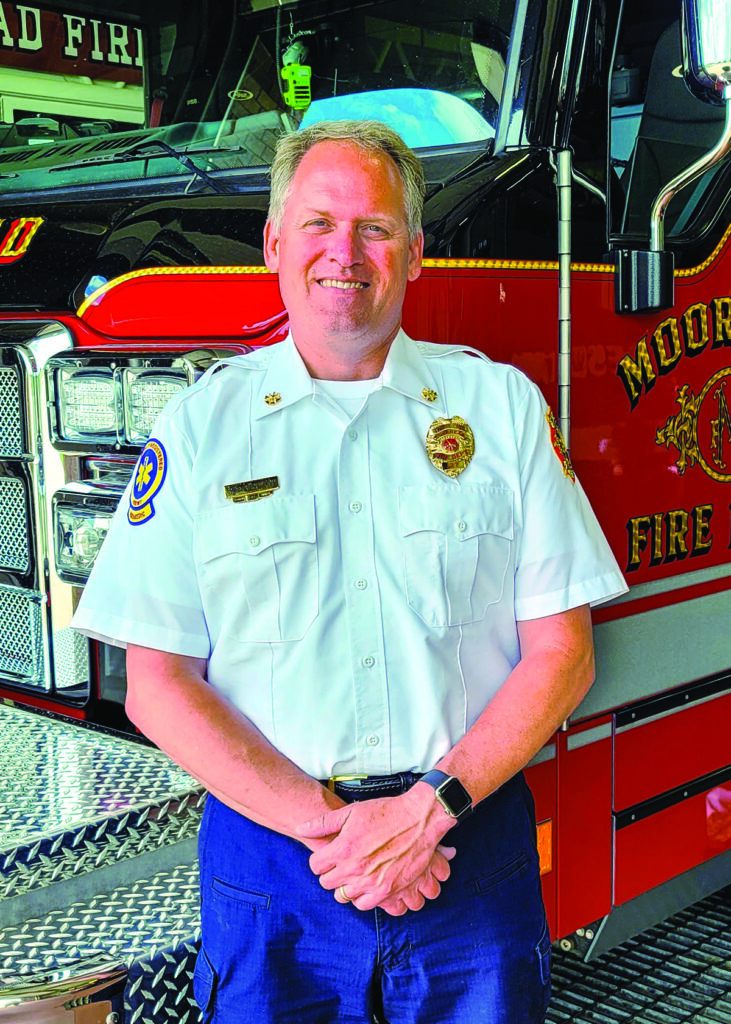Nancy Edmonds Hanson

Division Chief
Chad Stangeland
While boom-loving children of all ages look forward to a spectacular fireworks display on July 4th, the Moorhead Fire Department is hoping for another safe, quiet night.
“We’ll have a crew stationed at Horizons Park,” notes Division Chief Chad Stangeland. That’s where the Moorhead Business Association’s aerial splash will be launched – predicted by the MBA to be “bigger, higher and better than ever.”
Spectators and other civilians will be kept well away from the park, where a licensed professional pyrotechnics team will launch the explosive extravaganza. Ample parking, though, is located outside the danger zone, including VIP lots at Horizons and Dorothy Dodds schools and the Vista Education Center, where funds raised will be channeled to scholarships and the St. Joseph’s educational programs. Skywatchers are welcome in the large commercial lots around the area, as well as residential streets that are not posted.
Minnesota law is one of the region’s strictest when it comes to private fireworks. “If it flies up in the air or goes ‘boom,’ it’s illegal on this side of the river,” the fire chief points out, citing not only aerial displays but firecrackers of all calibers. Boomless ground displays like fountains are permitted, along with sparklers and similar children’s favorites.
“But since you can drive over the river and buy whatever you want, we can’t keep them all out,” he adds. “No one polices the state line.”
Nevertheless, Stangeland and his crews are counting on residents’ observance of the rules along with their common sense for another generally safe Fourth, as has been typical throughout his 25 years with the local department. Recent rains have somewhat dampened the explosive fire danger the Department of Natural Resources cited earlier in the summer. “It doesn’t take too many hot, dry days to change that,” he cautions. Burning bans issued earlier this year continue in the city’s Oakport addition, the only area within the city limits where private open burning permits are issued except for special events, like homecoming celebrations.
But fireworks are far from the only hazard that leads to fire calls, especially in summer, when outdoor gatherings around bonfires and pleasant weather sometimes spur casual behavior that can go up in flames. “People don’t perceive the risk in something they’ve done a hundred times before with no sign of trouble,” he says. “We all need to stay alert. The situation can change.”
Stangeland points out that the DNR has issued strict guidelines on the placement of fire rings in Minnesota’s back yards. Permanent fire rings can be no wider than 3 feet, and flames can flare no more than 2 feet above them. They must be located at least 25 feet from any combustible material, whether buildings or “vegetative material.” Those in charge of these recreational fires are mandated to have a hose or fire extinguisher ready, and to keep an eye on the fire at all times.
The rules for portable fire rings are somewhat more lenient, since they’re equipped with flame resisters. They must be at least 15 feet from combustibles.
One of the most common causes of fire calls seems like the smallest – smoking and disposing of cigarettes outdoors. “Smoking on patios and balconies increases the risk,” the fire chief points out. Smokers commonly dispose of them in containers full of other cigarette refuse … and that pile of butts burns.
They may also thoughtlessly stub them out in plastic containers filled with peat or plants that have dried out. “That’s all combustible. After all, plastic is made of petroleum,” he emphasizes. “These fires can smolder for a long, long time without anyone noticing. On these hotter days, the heat can’t dissipate, so you’ve got fuel and heat. Then, when the wind comes up, that adds the oxygen, and you have a fast-burning fire on your hands – hours after you were smoking out there.”
Even grilling steaks can lead to disaster. “Most people use charcoal. The problem is how they dispose of it afterwards,” he explains. “It stays hot for hours, even after you think the coals are out. But people want to clean out the grill and go to bed, so they scoop them out, put them in a plastic bucket and store them in the garage. Now, we’ve got an issue.”
Fire safety is a matter of not letting summer lull you into a false sense of security. “Follow the rules. Always stay with your recreational fire. Keep people at a safe distance, especially excited kids. Think before you snuff out a cigarette near combustible materials. Make sure your grill is completely cool before you empty it.
“Most things are pretty simple. Just pay attention,” the firefighter advises. “Every time, no matter how many times you’ve done it, pay attention and put safety first.”


